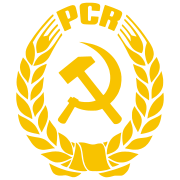More languages
More actions
Romanian Communist Party Partidul Comunist Român | |
|---|---|
 | |
| General Secretary | Gheorghe Cristescu (first) Gheorghe Gheorghiu-Dej (first governing) Nicolae Ceaușescu (last) |
| Founded | 8 May 1921 |
| Dissolved | 22 December 1989 |
| Preceded by | Socialist Party of Romania (Partidul Socialist din România) |
| Newspaper | Scînteia (The Spark) |
| Youth wing | Uniunea Tineretului Comunist (Union of Communist Youth) |
| Membership (1989) | circa 4 million |
| Political orientation | Marxism-Leninism Anti-revisionism National Communism |
| National affiliation | Front of People's Democracy (Frontul Democrației Populare; 1944-1968) Front of Socialist Unity and Democracy (Frontul Democrației și Unității Socialiste; 1968-1989) |
| International affiliation | Comintern Cominform |
The Romanian Communist Party (Partidul Comunist Român), was the ruling party of the Socialist Republic of Romania from December 1947 to December 1989.
Names[edit | edit source]
- Socialist-Communist Party (Partidul Socialist-Comunist; PSC) (1921)
- Communist Party of Romania (Partidul Comunist din România; PCdR) (1921-1948)
- Romanian Workers' Party (Partidul Muncitoresc Român (Romîn from 1953 to 1964); PMR) (1948-1965)
- Romanian Communist Party (Partidul Comunist Român; PCR)
History[edit | edit source]
| Part of a series on |
| Communist parties |
|---|
Founding[edit | edit source]
The party was founded in 1921 after the pro-Bolshevik faction of the Socialist Party of Romania (Romanian: Partidul Socialist din România) won control of the party. A splinter group consisting primarily of social democrats founded the Romanian Social Democratic Party (Romanian: Partidul Social Democrat Român) in 1927.
Interwar Period and World War II[edit | edit source]
Before World War II, many communists were targeted and imprisoned by the Romanian monarchy;[1] and persecuted by the fascist leader Ion Antonescu during the war.[2]
Cold War[edit | edit source]
After Romania was liberated by the Red Army, Gheorghe Gheorghiu-Dej became the General Secretary of the party and Romania became a socialist state.
Gheorghe Gheorghiu-Dej died of cancer in 1965, and was succeeded as General Secretary by Nicolae Ceaușescu, who also became President of the State Council in 1968. In 1989, after Radio Free Europe incited a counter-revolution in Romania, Ceaușescu was executed and the party was dissolved.[3]
References[edit | edit source]
- ↑ Diana Condrea. "100 Years in the History of Romania" Uncover Romania.
- ↑ C. Bărbulescu et al. (1971). File din istoria U.T.C (Romanian: File din istoria U.T.C) (p. 199). Bucharest.
- ↑ Encyclopædia Britannica (2021).
